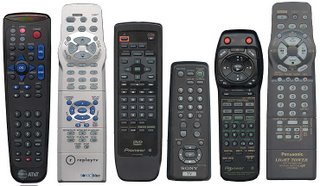Of Hubs, Gateways and Doorkeepers
The way to a man's heart may well be through his stomach unless, as my humourist friend Rahul maintains, you're a cardiac surgeon. However increasingly, the way to his wallet, if you're a media, content, or entertainment business, may be through his home hub.
There has been plenty of writing about the potential of home networks. This one in the FT today (subscr) suggests that they may already be among us. According to this, Thomson's Livebox (mistakenly refered to as "lifebox" in the article) has sold 2.5 m units in Europe. And BT have also announced a similar device using the same design.
In its most evolved form, the home hub can store content, connect to the Internet and serve all the devices in the home - laptops, televisions, phone devices and game consoles, all wirelessly and most using IP.
Although there are counter views, and people quoted in the same article argue that the PC does this job well enough, once IP based voice and Television take root, and the number of devices in the home increase, the hub clearly comes into its own. Cost may be an issue but Intel's Viiv is one of many products aiming to drive the price of chips down. And with the world-wide chip market consolidating, fast, it's quite likely that prices will move down and stay down - driving more adoption by consumers.
Will the home be network centric or server centric? Another question debated in the article, but again you would have to believe that the route to the network centric world is through the server stage. Again, the hub is the closest thing to the home server. How complex will it be? Well hopefully the providers will figure out a set of simple interfaces. Ruwido is a company that makes interesting input devices (keyboard/remotes) and Motive creates software intelligent automation software which goes into services delivered by broadband providers. These will play their role in simplifying. But to be honest, how much more complex can the home hub be than some of these?
hopefully the providers will figure out a set of simple interfaces. Ruwido is a company that makes interesting input devices (keyboard/remotes) and Motive creates software intelligent automation software which goes into services delivered by broadband providers. These will play their role in simplifying. But to be honest, how much more complex can the home hub be than some of these?
Another company (also mentioned in the FT Article, and one that has an innovative approach to in-home networks is Ruckus, which uses an innovative network design to ensure signals can go through walls and are directionally sensitive, and also analyses for dropped packets.
Whatever the network design, though, you would do well to keep an eye on the "Home Hub" space. Companies which aleady have a device in consumer homes are making their play to become this device. TiVo has signed up a number of content providers including NBA, CNET and iVillage, according to this article from the Wall Street Journal online, with some content coming straight to the box off the Internet. Likewie, According to the piece, the users of devices such as this don't even know / remember sometimes whether what theyre watching is coming to them via the web or via traditional broadcast systems. Whoever owns this space could well weild as much power as Microsoft, did, in the PC era.
Speaking of which, as you know the Ray Ozzie has just declared the PC era over, at Microsoft. But more on that another time. For now, keep your eye on the Home Hub, because Microsoft (Zune?) could pop up there as well.
There has been plenty of writing about the potential of home networks. This one in the FT today (subscr) suggests that they may already be among us. According to this, Thomson's Livebox (mistakenly refered to as "lifebox" in the article) has sold 2.5 m units in Europe. And BT have also announced a similar device using the same design.
In its most evolved form, the home hub can store content, connect to the Internet and serve all the devices in the home - laptops, televisions, phone devices and game consoles, all wirelessly and most using IP.
Although there are counter views, and people quoted in the same article argue that the PC does this job well enough, once IP based voice and Television take root, and the number of devices in the home increase, the hub clearly comes into its own. Cost may be an issue but Intel's Viiv is one of many products aiming to drive the price of chips down. And with the world-wide chip market consolidating, fast, it's quite likely that prices will move down and stay down - driving more adoption by consumers.
Will the home be network centric or server centric? Another question debated in the article, but again you would have to believe that the route to the network centric world is through the server stage. Again, the hub is the closest thing to the home server. How complex will it be? Well
 hopefully the providers will figure out a set of simple interfaces. Ruwido is a company that makes interesting input devices (keyboard/remotes) and Motive creates software intelligent automation software which goes into services delivered by broadband providers. These will play their role in simplifying. But to be honest, how much more complex can the home hub be than some of these?
hopefully the providers will figure out a set of simple interfaces. Ruwido is a company that makes interesting input devices (keyboard/remotes) and Motive creates software intelligent automation software which goes into services delivered by broadband providers. These will play their role in simplifying. But to be honest, how much more complex can the home hub be than some of these?Another company (also mentioned in the FT Article, and one that has an innovative approach to in-home networks is Ruckus, which uses an innovative network design to ensure signals can go through walls and are directionally sensitive, and also analyses for dropped packets.
Whatever the network design, though, you would do well to keep an eye on the "Home Hub" space. Companies which aleady have a device in consumer homes are making their play to become this device. TiVo has signed up a number of content providers including NBA, CNET and iVillage, according to this article from the Wall Street Journal online, with some content coming straight to the box off the Internet. Likewie, According to the piece, the users of devices such as this don't even know / remember sometimes whether what theyre watching is coming to them via the web or via traditional broadcast systems. Whoever owns this space could well weild as much power as Microsoft, did, in the PC era.
Speaking of which, as you know the Ray Ozzie has just declared the PC era over, at Microsoft. But more on that another time. For now, keep your eye on the Home Hub, because Microsoft (Zune?) could pop up there as well.


0 Comments:
Post a Comment
<< Home